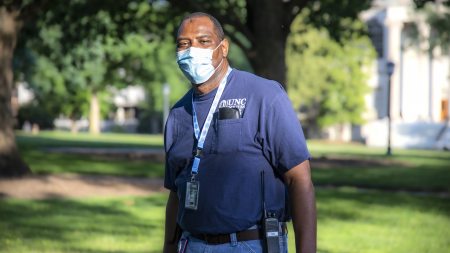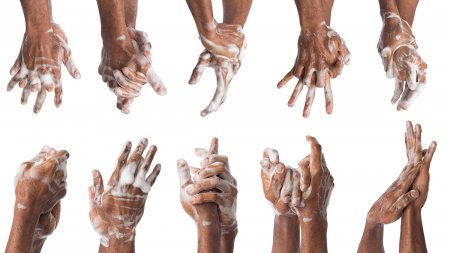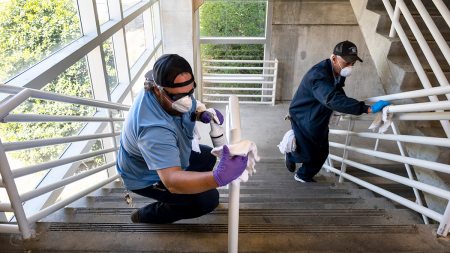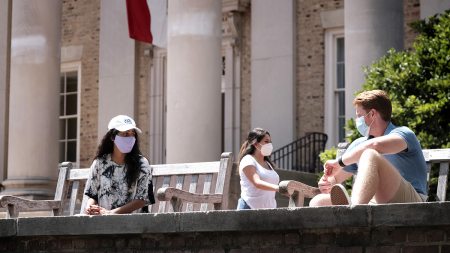Returning to Carolina
The Roadmap for Fall 2020
The start of the fall semester is almost here, and we are excited to begin another school year in Chapel Hill. You already know, this year will be different than any in Carolina’s history. We will need everyone’s help to keep the Tar Heel community safe.
Working alongside our renowned infectious disease and public health experts, Carolina has implemented a new set of Community Standards and University Guidelines that include face coverings, physical distancing, hand washing and health monitoring.
The Carolina community is counting on each one of us to work together so that everyone — our roommates, our classmates, our professors, our coworkers — can enjoy a successful semester.
- Press the play button to learn more

Learn moreOur Carolina Together Roadmap will be updated continuously based on new information provided by UNC-Chapel Hill’s world-class infectious disease and public health experts, state and local health officials, the UNC System and the valuable feedback from our faculty, students, staff and community.
Protect our community
Whether you’re heading to class or grabbing dinner on Franklin Street, knowing your Ws — wear, wait and wash — is critical for keeping the community safe.
According to the Centers for Disease Control and Prevention, the primary way COVID-19 spreads is through respiratory droplets produced when an infected person coughs, sneezes or talks. By wearing a face covering, waiting 6 feet apart from others and washing your hands thoroughly and often, you can protect our campus community and help all Tar Heels to thrive.

Wear a face covering
Covering your mouth and nose is the single best thing you can do to reduce the viral spread. Face coverings are a top priority.
All students, faculty, staff and visitors must wear face coverings on campus. This means in classrooms, public buildings, in common spaces in residence halls and in dining halls — except for when eating or drinking. When you’re outside, relaxing or walking to classes or between buildings, you are still required to wear a face covering if you are unable to physically distance from others.
Make sure you have a face covering with you at all times – toss one in your bag so you always have one nearby. If you do forget, the University will provide one for students, staff and faculty free of charge. If you are able, have a face covering for each day of the week. After wearing one, place it in a labeled paper bag for use one week later. CDC research shows the virus will not live on such a surface for a week.
Wait
Practice physical distancing whenever possible. This is another simple way to help prevent the spread of the coronavirus.
Research has shown that transmission of COVID-19 can occur even when individuals are asymptomatic. Keeping space between you and others will reduce your risk of being exposed. Students, staff, faculty and visitors should stay at least 6 feet away from others when possible — inside and outside. If you can’t physically distance, make sure you have a face covering. Wearing a mask while physically distancing is even better.
You should also avoid gathering in large groups and avoid crowded areas.
To help all of our students, faculty and staff physically distance as much as possible, the University is reimagining campus spaces and finding new ways for students to connect and socialize.
Wash
Wash your hands frequently, and thoroughly, for 20 seconds. If soap and a sink aren’t nearby, use hand sanitizer.
Washing your hands with soap and water is one of the best ways to remove germs, avoid getting sick and prevent spreading germs. Always wash your hands after touching frequently touched surfaces, such as doorknobs, elevator buttons and printers, and avoid touching your face, especially after touching these surfaces.
Clean your living and workspaces regularly. This can also help prevent COVID-19 from spreading. Cleaning and disinfecting supplies will be in each workplace, classroom, residence hall, dining facility and other campus facilities.

Stay safe, stay healthy
Masks, masks and more masks
With research identifying the nose as the coronavirus’s main entry point, Carolina experts offer tips on best masks, best fit and best practices.
The ABCs of hand-washing
Carolina’s Allison Aiello added her expertise on disease prevention to the World Health Organization’s guidelines for COVID-19 prevention.
Carolina researchers map how coronavirus infection travels through cells of nasal cavity and respiratory tract
A major study of coronavirus infection in human airways adds to evidence that wearing a mask is an important protective step toward limiting transmission of COVID-19.
Student survey examines public health attitudes
A recent survey showed that undergraduates are largely willing to wear masks while they’re on campus, but less likely to physical distance or avoid large gatherings.



